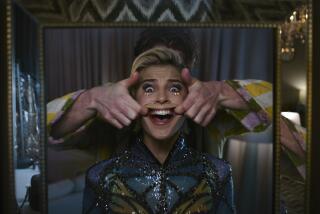MOVIE REVIEW : An Afterlife Love Story
In our increasingly fragile and unpredictable world, “Ghost”(citywide) might well strike a seductive chord: a lover from the afterlife hovering over his beloved to keep her from harm, trying to communicate the love he couldn’t express to her in life.
The movie’s slogan is “Believe,” not an unreasonable request. But even those who’d be happy to comply must get past “Ghost’s” one casting jaw-dropper, a certain woolly-mindedness to its script and a production prettified to the point of stickiness.
With some of its actors--Demi Moore as the cracked-voice, desolate lover; Whoopi Goldberg as an extremely reluctant spirit go-between and Vincent Schiavelli as an irascible, subway-dwelling ghost who will teach our novice tricks of the nether world--things are in the best hands possible.
But Patrick Swayze as a corporate New York banker? The filmmakers know Swayze’s appeal perfectly well: He has to move, he has to turn dancing into an act of lovemaking and he has to take his shirt off more often than Sigourney Weaver. All this he does, no matter how implausible the surroundings; you even begin to suspect that certain scenes were earmarked Swayze Shirt Opportunity.
In all his athletic scenes, leaping through doors, leaping between uptown and downtown trains, leaping on an assortment of villains, Swayze is just fine. It’s the movie’s big cosmic questions that throw him; for these he’s reduced to a look of total stupefaction--not the movie’s finest moments, although they may be some of its most collectible ones.
Ah well, the same audiences who bought Jennifer Beals as a rugged shipyard welder in “Flashdance”--from the same studio--will probably have no trouble with Swayze’s banker. Put it down as wish fulfillment.
Screenwriter Bruce Joel Rubin has had fun updating the rules governing ghostly behavior: Today’s ghosts don’t seem to be able to whooooosh places at will. In New York they must still take the subway, although they can change without a transfer. Making objects move, however, is harder than it might seem; it takes a lot of practice--and first-rate special effects, which “Ghost” fortunately has.
Rubin is less successful with the lovers’ winsome dialogue; the bit with Moore saying “I love you,” Swayze answering “Ditto.” Rubin’s frail little plot involves skulduggery among the bank accounts and supposedly bright central characters who can’t seem to tell the snakes from the saints. “Ghost” is billed as a mystery, but it doesn’t stay one long: The villain’s sincerity is about as real as Eddie Haskell’s, and as transparent. In any case, mystery isn’t the point of “Ghost.”
Director Jerry Zucker is packaging the distilled essence of romantic yearning and he’s done a canny job of it. First there’s his setting: A lot of “Ghost” takes place in a yuppie dream of a Manhattan TriBeCa loft, all muted creams and taupes and beiges, with enough square footage to set up a bowling alley. In the bathroom.
Then he teases us with one situation after another in which we think Swayze’s Sam Wheat will depart this life. Will it be as he helps the movers wrestle a highly symbolic antique angel through his loft window? Will it be at the hands of a late-night intruder, as he and Demi Moore’s Molly Jensen smooch over the clay she’s shaping on her potter’s wheel?
Zucker’s staging of this scene isn’t subtle but it’s certainly effective. He mixes his audience’s childhood memories of messing around with silky, squishy, slippery clay with the full-blown visual eroticism of two adults sharing the same sensual experience--and each other. It’s an almost tangible charge, and probably before you get out to the theater parking lot it will have been knocked-off by seven less adroit directors.
One way or another, Sam does die, Molly does mourn and after a sort of baptismal sprinkling of astral dandruff, Sam begins to figure out his ghostly guidelines and the fact that Molly is in danger. Most importantly, he discovers that psychic Oda Mae Brown (Goldberg), the biggest charlatan since the Wizard of Oz, is the only person on Earth who can hear him. With her arrival, this little spun-sugar movie gets some needed vinegar.
Oda Mae, stunned to discover that for the first time her gift is real, is Goldberg in her element, giving the film its kick and energy. In the three-way scenes with Sam and Molly, as Sam’s mouthpiece on Earth, translating, transposing, deleting in outrage when his language offends her, Goldberg is gleefully, wickedly funny. Working out the villain’s comeuppance, she’s even better.
As the anguished and vulnerable Molly, Moore manages to give backbone and definition to a role that must be played largely through sheets of tears. Clearly the hope is that the audience is in a similarly soggy condition and doesn’t giggle at moments when they should be wowed, like Sam’s radiant oneness with the hereafter. It may be pushing believe one step beyond.
More to Read
Only good movies
Get the Indie Focus newsletter, Mark Olsen's weekly guide to the world of cinema.
You may occasionally receive promotional content from the Los Angeles Times.










